24 Generation Z Statistics That Matter for Marketers in 2022

A few years ago, the oldest members of Gen Z were still in high school. Almost babies. Now the oldest of them are 25 years old and are rapidly moving up the corporate and other career ladders.
How do you adjust your marketing strategy to include Gen Z without rejecting existing audiences or, worse, making it look like you’re trying too hard?
Here’s what you need to know about Generation Z in order to effectively market to this savvy, smart, socially minded generation.
Gen Z General Statistics
1. Generation Z makes up 20.67% of the US population.
That’s 68,600,000 Americans.
Some say that anyone born in the 1990s is part of Generation Z, although the most widely accepted definition includes those born in or after 1997. Many researchers agree that Generation Z ends in 2010, but some argue that 2012 is the limit when Generation Z ends and Generation Alpha begins.
2. Most Generation Z support a more inclusive society.
While the same number of Gen Zers as millennials – 84% – say that marriage equality is either good or neutral for society, Gen Z is more likely to think that people who use gender-neutral pronouns should be more accepted.
59% think there should be more options than “male”or “female”on forms and other documents, and 35% personally know someone who uses gender-neutral pronouns.
So don’t jump on the “rainbow wash” of your next campaign solely for Pride Month in the hope that your efforts will go viral. Show real support to your 2SLGBTQIA+ customers and community by continually donating proceeds to charity or taking other meaningful action.
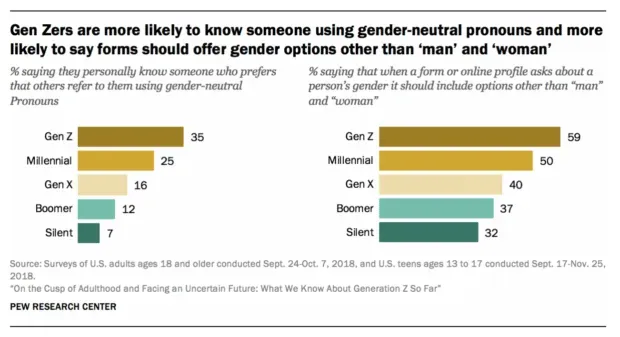
3. Almost a third of Generation Z worry about the cost of living.
While the cost of living (29%) and climate change (24%) are top concerns for both Gen Z and Millennials, Gen Z is much more concerned about mental health (19%) and sexual harassment (17%) than previous generations.. In addition, only 28% of Generation Z believe their economic situation will improve over the next year.
This doesn’t mean that your marketing should be set to doom and gloom, but knowing what your customers struggle with allows you to offer opportunities for genuine connection.
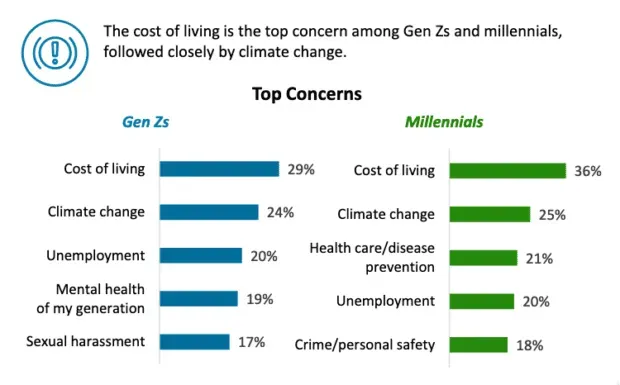
4. 95% of people aged 13-17 use YouTube.
The top three most popular social platforms among young Gen Zers are YouTube (95%), TikTok (67%) and Instagram (62%).
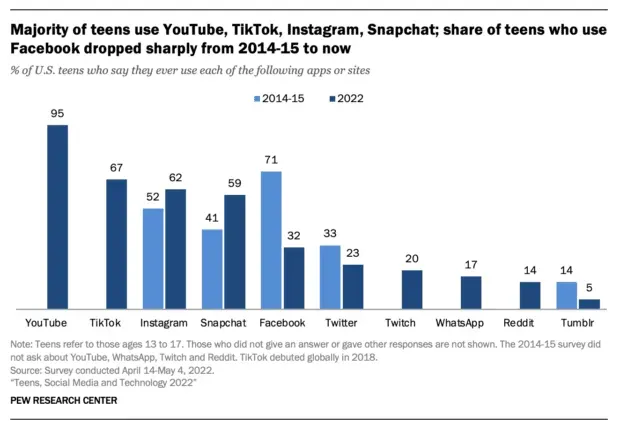
While you don’t have to use every platform your audience uses just because they do, you should be aware of changing trends. Do you know what is perfect for this? Our Social Trends 2022 report and future updates where we do it for you.
5. 36% of American teenagers aged 13-17 feel they spend too much time on social media.
Also from the same study: 54% find it hard to stop using social media.
Most teens who thought so were aged 15-17, indicating that social media use becomes even more firmly established in their daily lives as they get older.
6. 61% prefer short videos that are less than 1 minute long.
Generation Z and millennials were grouped together in this study, but the implications are clear: a short video is the future and the present.
However, longer content is not dead. The same study found that 20% of people also watch videos longer than 30 minutes. The key point is context. Where does Generation Z watch short videos? What videos are they watching?
Which brings us to…
7. Gen Z spends 24 to 48 hours a month on TikTok.
That’s about 5% of total waking time, using estimates from research in our Digital Trends 2022 report. While these statistics weren’t limited to Generation Z, it’s fair to assume that they spend at least 24 hours a month on TikTok, which is the most conservative estimate of the data from the survey.
Other studies have shown that the average user spends 48 hours a month on TikTok. It’s two days. Twenty-four days a year. Almost month! Wow.
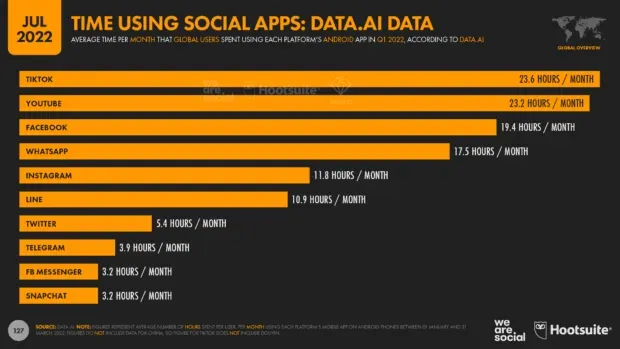
Remember when Twitter had its own short video format, Fleets, in 2021? No you do not know. Lesson learned? TikTok is the king of short forms. Get an account and plan your TikTok marketing strategy now (if you haven’t already).
if you see Fleet no, you didn’t see https://t.co/4rKI7f45PL
— Twitter (@Twitter) August 3, 2021
8. BeReal is currently the best social media app in the Apple App Store.
Never heard of it? You are not alone. The app was launched in 2020 but has recently become popular among Generation Z.
It sends out random notifications that users have two minutes to respond to by posting a message on the app. Unlike today’s platforms where users spend a lot of time editing photos and compiling eloquent captions, BeReal is geared towards quick updates. You have to share how you look at the moment through a photo in the app – there are no filters or photo editing options – and what you are doing.
While BeReal is not intended for brands, it’s important to recognize when new apps come up and evaluate if they fit into your marketing strategy.
9. 83% of Gen Z stores are on social media.
The pandemic has increased overall consumer social shopping comfort, but Gen Z has been leading the way in terms of social media focus well into 2020.
Now that major platforms like Facebook, Instagram, TikTok, and more offer social commerce tools like in-app payment, it’s time to set up your social store if you haven’t already.
10. Nearly 1/3 of brands unfollow or block social media accounts weekly.
However, no pressure to get this content right before posting, okay? The reason Gen Zers named this in the study was because they were weeding out companies they thought pretended to care but really only care about profits. It has nothing to do with the products or the quality of the company, but only with their actions and messages.
We know what you hear all the time: “Build a real brand!” Okay, but what does that mean?
This means being human in your approach to marketing, social media, and customer interactions.
Generation Z and technology statistics
11. 95% of American teenagers aged 13-17 have a smartphone.
In 2015, this number was only 73%, which is 30% more than in 7 years.
In addition, 90% own a computer and 80% own a gaming device at home, which is roughly the same as in 2015.
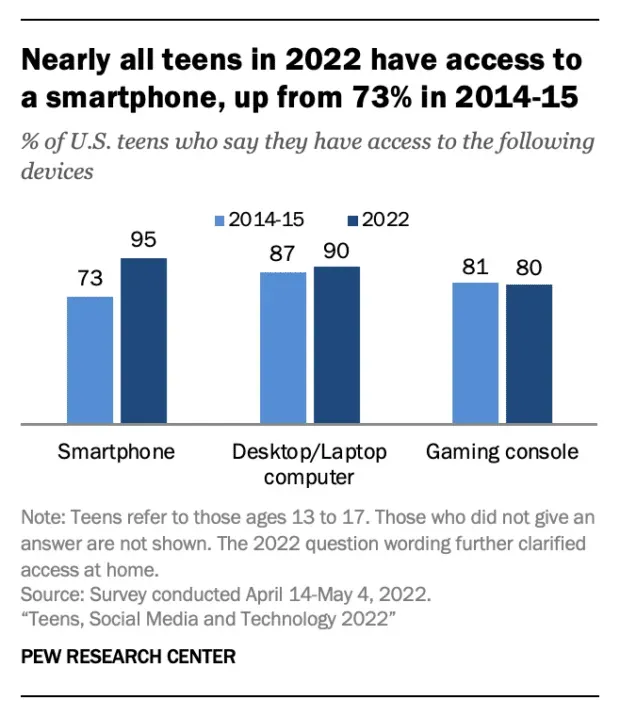
Smartphones have now become a way of life and will likely be your first touch point with Generation Z.
12. 60% believe digital first impressions are more important than personal first impressions.
This is smart thinking given the social media monitoring capabilities of many HR departments. It also means Gen Zers evaluate your first digital impression before they even consider buying from you.
13. 43% of Gen Zers remember the last website they visited, but not their partner’s birthday.
Only 38% remember their partner’s birthday more often than the last click on the site. Oh. Don’t be discouraged: 31% remember a website more than their own social security number.
14. 40% of Generation Z use TikTok for search instead of Google.
Um, what? That was my first reaction when I heard this as a 35 year old man. But it keeps track:
It’s important to note that the 40% figure was a comment made by a Google VP during a keynote about Google products and how search has changed. While the number can’t be verified right away, he said that Google looked into it, and these were their findings about US users aged 18 to 24.
So it’s completely legal. (But what are we going to say now instead of: “Just google it?”, “I’ll give it up?”, “Let me tick it for you?”Rude.)
15. 92% of Gen Zers multi-task while browsing the web.
This is more than any other generation. Web browsing tasks include eating (59%), listening to music (also 59%) and talking on the phone (45%).
Marketers assume that your Gen Z audience will be at least partially distracted when interacting with your content. Make headlines big, pages easy to read, and get to the point quickly.
16. 85% prefer chat or automated customer interaction over the phone.
This is a significant difference compared to boomers, where only 58% use chat or automated tools when they need customer service.
Automated customer service doesn’t always save money, it can also provide faster and easier results for your customers. In addition, business chatbots can combine automation with the real possibilities of live human interaction to get the best of both worlds.
Generation Z online shopping statistics
17. 64% browse a local business website before making a purchase or visiting it in person.
This highlights the importance of a professional online brand image, even if you don’t (and don’t plan to) sell online.
Reserve your social media name and at least upload your logo as a profile picture. Create a website, even a simple one, with a list of your services, hours, and ways to contact you.
18. 97% think social media is the best way to find shopping options.
Whether you’re scrolling through influencer posts, ads, or friends’ content, Gen Z is shopping first and foremost on social media. Your marketing strategy should consider how you will connect with them on social media. The easiest way? Influencer marketing.
19. 87% want a personalized shopping experience
Personalized marketing is not new, and in fact, the percentage of shoppers who want personalized services from brands has remained relatively constant since Generation X (1965–1980).
If you’re not already investing in personalization strategies beyond “Hello, [name]”, do so.
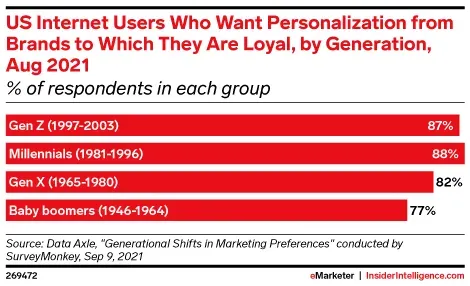
20. …But only 39% of Generation Z trust companies to protect their personal data.
Nearly the highest demand for personalized service with the lowest level of business confidence? Cool, great combination.
Build trust with security policies to protect customer data from theft, cyberattacks, and other threats. But customers won’t browse your terms for fun. You must communicate trust and responsibility on the registration and checkout pages.
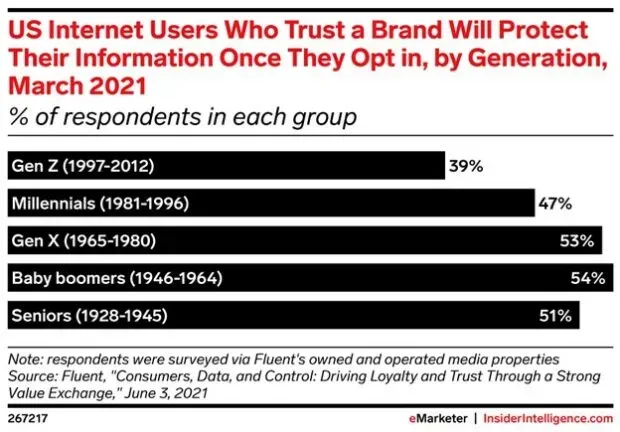
21. 73% of Generation Zers only buy from brands they believe in.
There is a significant difference between the older and younger members of Generation Z. 84% of 14-17 year olds said they make purchasing decisions based on values, while 64% of 18-26 year olds said the same.
Previous generations did not expect private business to be so involved in society. Now, without taking a position on social issues, he takes a position. However, make sure you do it sincerely because people can tell when you do it just for views.
22. 71% stay loyal to trusted brands even when they make a mistake.
Trust is important for customers of all generations, but it is paramount for Gen Z. 61% of Gen Z will pay more for brands they trust, and 71% will forgive and even recommend brands they trust that make mistakes.
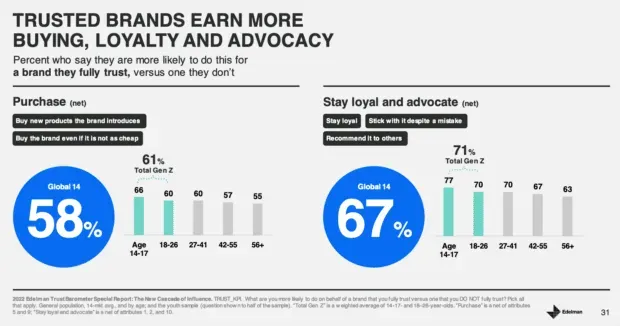
23. 64% would pay more for organic products.
While 46% of Generation Z live paycheck to paycheck, 64% will still pay more for sustainable products. This highlights the importance of climate change to Generation Z and the personal responsibility they feel to make a difference.
If you’re not already making all or a few of your products sustainable, this should be on your to-do list.
24. 55% will use the “buy now, pay later” option at least once a year.
Generation Z most enjoys any generation’s “buy now, pay later”service. The average American using these services spends about $1,000 a year this way.
Ecommerce retailers should offer this as a payment method.
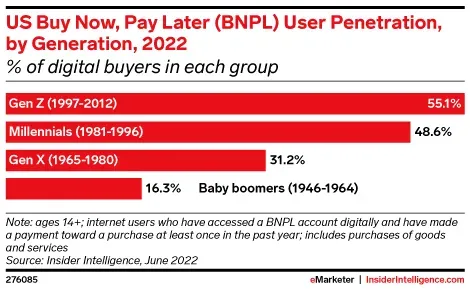
Leave a Reply